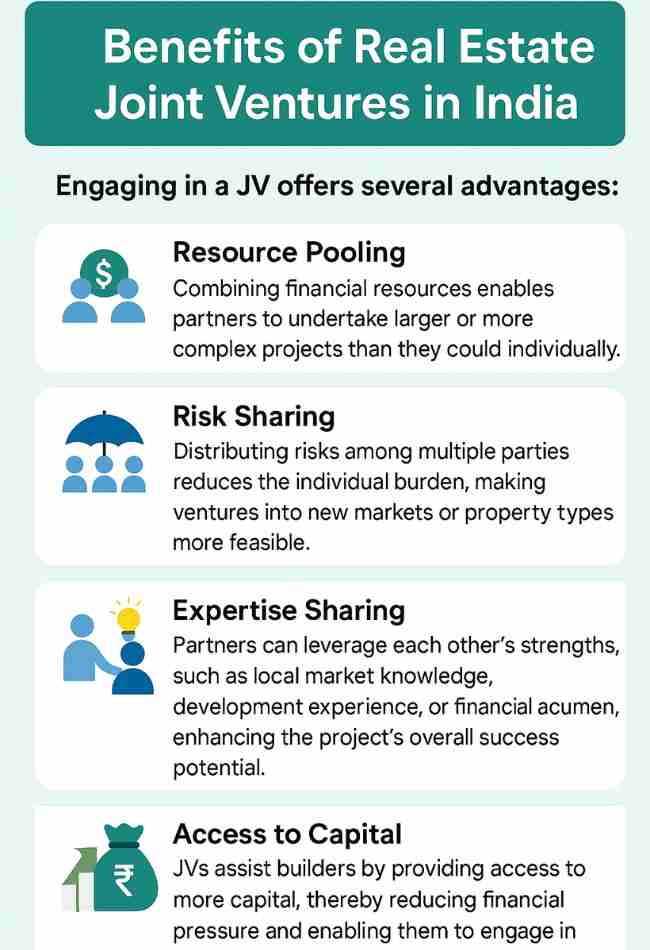Last Updated on April 2, 2025 by Admin
In the dynamic landscape of Indian real estate, joint ventures (JVs) have become a pivotal strategy for developers, investors, and landowners to collaborate, share resources, and undertake projects that might be challenging individually. This comprehensive guide delves into the nuances of real estate joint ventures within the Indian context, highlighting their structures, benefits, legal considerations, challenges, and notable examples.
Table of Contents
What is a Real Estate Joint Venture?
A real estate joint venture is a strategic alliance between two or more parties to develop a specific property project while retaining their legal identities. In India, such collaborations often involve landowners providing land and developers offering capital and expertise to execute the project. This synergy enables pooling resources, risk-sharing, and leveraging combined strengths to achieve mutual objectives.

Common Structures of Real Estate Joint Ventures in India
The structure of a JV in India significantly influences its operation, tax implications, and liability distribution. Common structures include:
-
Limited Liability Partnership (LLP): Governed by the Limited Liability Partnership Act, 2008, LLPs offer flexibility and limited liability to partners, making them a popular choice for real estate JVs.
-
Private Limited Company: Incorporating a private limited company under the Companies Act, 2013, provides a separate legal entity with limited liability for shareholders. This structure is often preferred for larger projects requiring substantial capital.
-
Unincorporated Partnerships: These are governed by the Indian Partnership Act, 1932, and involve a contractual agreement between parties. While simpler to establish, partners may have unlimited liability, which poses higher risks.
Key Components of a Joint Venture Agreement
A well-drafted joint venture agreement is crucial for the success of the partnership. Essential elements include:
-
Capital Contributions: Detailed documentation of each party’s financial investment, including the timing and form of contributions.
-
Profit and Loss Distribution: Clear terms on how profits and losses will be shared among partners, which may not always be proportional to capital contributions.
-
Roles and Responsibilities: Explicit delineation of each party’s duties, decision-making authority, and management responsibilities to prevent conflicts.
-
Exit Strategy: Provisions for terminating the JV, including buy-sell agreements, procedures for adding or removing partners, and dispute resolution mechanisms.
Legal Framework Governing Joint Ventures in India
Navigating the legal landscape is crucial for the success of a JV in Indian real estate. Key legislations include:
-
Companies Act, 2013: Regulates the incorporation, governance, and compliance requirements for companies involved in JVs.
-
Foreign Exchange Management Act (FEMA), 1999: Governs foreign investments and collaborations, outlining permissible investment limits and procedural requirements for foreign entities participating in Indian JVs.
-
Real Estate (Regulation and Development) Act (RERA), 2016: Aims to protect homebuyers and boost investments by ensuring transparency and accountability in real estate transactions.
-
Indian Contract Act, 1872: Provides the legal foundation for contractual agreements, ensuring enforceability and outlining remedies for breach of contract.
Compliance with sector-specific regulations is also essential, particularly in industries where foreign investment is restricted or requires government approval.
Benefits of Real Estate Joint Ventures in India
Engaging in a JV offers several advantages:
-
Resource Pooling: Combining financial resources enables partners to undertake larger or more complex projects than they could individually.
-
Risk Sharing: Distributing risks among multiple parties reduces the individual burden, making ventures into new markets or property types more feasible.
-
Expertise Sharing: Partners can leverage each other’s strengths, such as local market knowledge, development experience, or financial acumen, enhancing the project’s overall success potential.
-
Access to Capital: JVs assist builders by providing access to more capital, thereby reducing financial pressure and enabling them to engage in bigger projects.

Potential Challenges and Mitigation Strategies
While JVs can be highly beneficial, they also pose challenges:
-
Regulatory Compliance: Navigating India’s complex regulatory environment requires thorough understanding and adherence to various laws and regulations. Engaging legal experts can ensure compliance and mitigate legal risks.
-
Partner Alignment: Differences in objectives, risk tolerance, or management styles can lead to conflicts. Conducting thorough due diligence and establishing clear communication channels are vital before forming a JV.
-
Decision-Making Disputes: Ambiguities in authority can cause delays or disagreements. Establishing clear governance structures and decision-making processes in the JV agreement can mitigate this issue.
-
Exit Complications: Unexpected circumstances may necessitate a partner’s exit. Predefined exit strategies and buyout provisions help manage such situations smoothly.
Notable Examples of Real Estate Joint Ventures in India
To illustrate the practical application of JVs in Indian real estate, consider the following examples:
-
Blackstone and Embassy Group: This JV resulted in the creation of India’s first publicly listed Real Estate Investment Trust (REIT), Embassy Office Parks, showcasing a successful collaboration between a global investment firm and an Indian developer.
-
Emaar Properties and MGF Developments: Emaar India was established as a JV between Dubai-based Emaar Properties and India’s MGF Developments, leading to significant projects like the Commonwealth Games Village in Delhi.
-
Calcutta Riverside: A satellite township development across 262 acres, this project is a JV between Riverbank Developers Pvt. Ltd. and Bata India Limited, exemplifying successful collaboration in mixed-use development.
Final Thoughts
Real estate joint ventures in India offer a strategic pathway for combining resources, sharing risks, and leveraging diverse expertise to undertake projects that might be challenging individually. By understanding the various structures, navigating the legal framework, crafting comprehensive agreements, and fostering transparent partnerships, stakeholders can effectively manage the complexities of JVs and unlock significant value in the Indian real estate market.
Note: This article is for informational purposes only and does not constitute legal or financial advice. Parties interested in forming a real estate joint venture should consult with legal and financial professionals to address their specific circumstances.
Related Posts:
- Top Professional Certifications for Civil Engineers in 2025: Enhance Your Career
- A Comprehensive Guide on How To Start a Construction Company in India
- What Is The Scope Of Entrepreneurship For Engineers In India?
- India’s Top 10 Ongoing Infrastructure Projects in 2025


